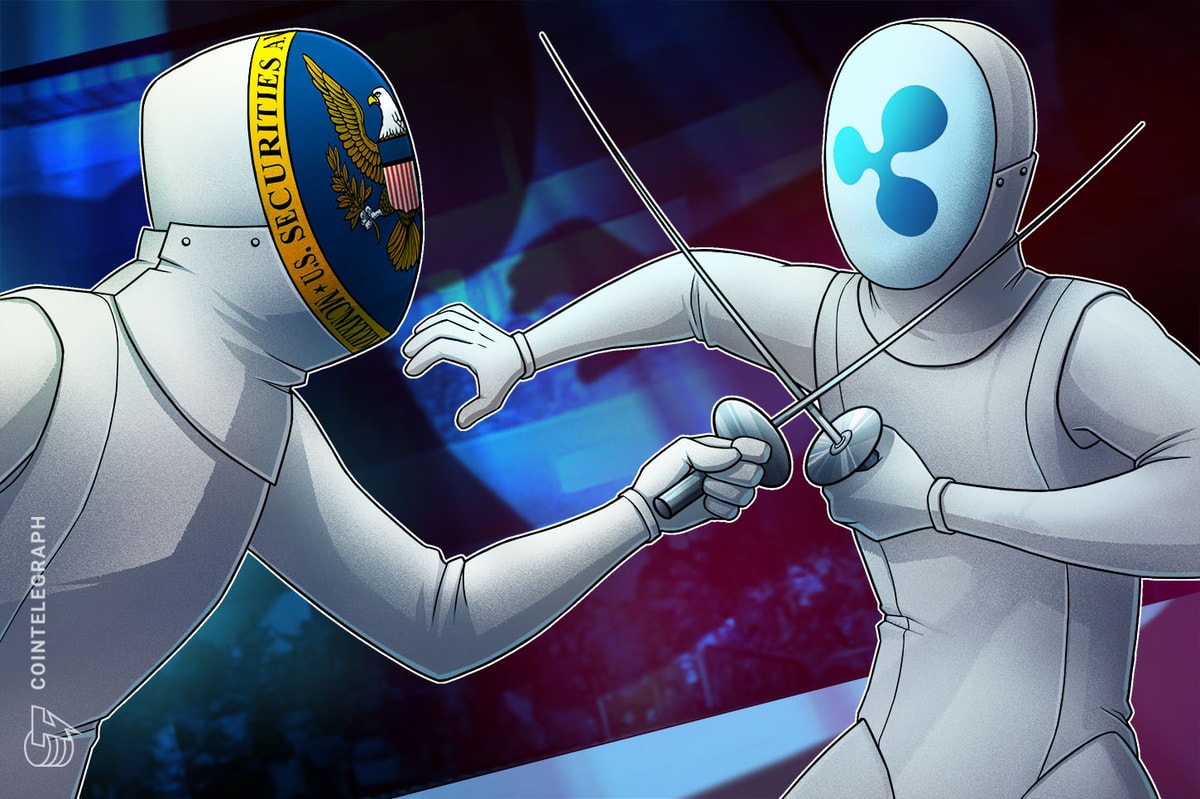
The continued case of the Securities and Alternate Fee v Ripple Labs might have a major influence on the way forward for cryptocurrency laws.
Ripple first popped up in 2012 with the promise of offering monetary establishments and different entities with sooner, extra inexpensive clearance of cross-border fund transfers. To that finish, Ripple created the XRP Ledger and a cryptocurrency referred to as XRP (XRP) to perform as its native coin and facilitate transactions.
On Dec. 22, 2020, the SEC sued Ripple, alleging that the agency promoting XRP represented an unregistered securities providing.
Ripple co-founder and former CEO Chris Larsen and present CEO Brad Garlinghouse had been additionally named within the SEC’s costs.
Most entities on the receiving finish of SEC enforcement actions select to settle. On this case, nevertheless, Ripple selected to combat the costs — at great expense — and take the matter to courtroom.
Ripple argued that XRP doesn’t fulfill the Howey check, which is used to find out whether or not an funding contract exists — and, subsequently, whether or not a transaction is a safety transaction. It additionally mentioned that if XRP was, in reality, a safety, the SEC had failed to present it truthful discover below U.S. securities legal guidelines.
Enter the Hinman paperwork
The “Hinman paperwork” check with a 2018 speech given by former SEC Director William Hinman and paperwork related to writing it.
Within the speech, Hinman mentioned that Ether (ETH) shouldn’t be thought of a safety given its decentralized nature, stating:
“Placing apart the fundraising that accompanied the creation of Ether, primarily based on my understanding of the current state of Ether, the Ethereum community and its decentralized construction, present provides and gross sales of Ether will not be securities transactions.”
This was thought of a landmark speech, because it signaled to the crypto trade that it may very well be attainable for cryptocurrencies to transition from securities when they’re first created to commodities as soon as they’re sufficiently decentralized.
This might have an effect on Ripple’s truthful discover protection, which comes into play if Choose Analisa Torres finds that Ripple did certainly promote unregistered securities.
@attorneyjeremy1 is right and this is the reason Ripple’s Truthful Discover Protection needs to be considered as an insurance coverage coverage. If the Choose finds Ripple violated Part 5 b/c these particular gross sales constituted funding contracts, Ripple argues the jury should determine if Ripple had truthful discover.
— John E Deaton (@JohnEDeaton1) May 18, 2023
Ripple requested the paperwork in discovery, and the request was granted on Oct. 21, 2022. Whereas the paperwork may very well be used as part of Ripple’s protection, the SEC has attempted to keep them sealed on a number of events, arguing that they’re irrelevant to the courtroom’s abstract judgment determination.
However on Might 16, Choose Torres dominated that the Hinman paperwork are “judicial paperwork” topic to a powerful presumption of public entry and denied the SEC’s motion to seal.
One other win for transparency! Unredacted Hinman emails to be publicly obtainable quickly – keep tuned because the attorneys work by way of the mechanics to make that occur. https://t.co/o6puPypRHd https://t.co/qmaLVeQaP8
— Brad Garlinghouse (@bgarlinghouse) May 16, 2023
Notably, the courtroom didn’t state whether or not the paperwork might be relied upon when it decides on the abstract judgment motions of every social gathering; however given the statements of those that have seen the paperwork, it seems doubtless they may negatively have an effect on the general public picture of the SEC.
I’ve at all times felt good about our authorized arguments, and I really feel even higher now.
I at all times felt unhealthy in regards to the SEC’s ways, and I really feel even worse about them now.— Stuart Alderoty (@s_alderoty) October 20, 2022
Moreover, there are questions on whether or not Hinman had a conflict of interest when making the speech, as he labored at a regulation agency that may be a member of an Ethereum advocacy group earlier than and after working for the SEC— and the paperwork could present further particulars round this.
Talking throughout a Twitter Area shortly after the ruling, lawyer and CryptoLaw founder John Deaton predicted the paperwork might be:
“Disturbing, however not as stunning as perhaps folks suppose it’s going to be as a result of there’s been, fairly frankly, such an enormous buildup for it. […] I consider when these emails come out, that the conflicts of curiosity might be much more highlighted.”
What does the most recent ruling imply for the case?
Whereas it’s nonetheless too early to inform what the final word consequence of the case might be, the courtroom additionally denied sure motions to seal from Ripple, which included references linking Ripple’s revenues with XRP gross sales and the quantity of compensation supplied to buying and selling platforms, amongst others.
Within the Twitter Area, Deaton highlighted these sections as proof prone to harm Ripple’s possibilities of an entire victory, including:
“I feel the possibilities of Ripple getting an entire victory are a lot slimmer after studying this than I felt earlier than. I nonetheless don’t suppose the SEC is getting an entire victory both.”
Deaton theorized that the courts might determine to positive Ripple for its early gross sales of XRP — regarding the preliminary coin providing and different transactions geared toward boosting the community — however that secondary gross sales of XRP and the coin itself will not be securities.
If the above state of affairs occurs AND the Choose agrees w/Ripple that the jury should then determine whether or not these early gross sales needs to be excused as a result of Ripple lacked truthful discover that XRP gross sales had been successfully unlawful (unregistered), it will possibly solely be described as a TOTAL VICTORY for Ripple.
— John E Deaton (@JohnEDeaton1) May 18, 2023
Deaton’s ideas on the topic got additional credibility when former SEC securities lawyer Marc Fagel added his voice to the Twitter Area, saying that he typically agreed with all the things that had been mentioned however that the SEC’s swimsuit was worded in a means that targeted on the tokens issued by Ripple and never secondary market transactions.
Fagel added that he thought Torres “can be overstepping to make a ruling on secondary gross sales,” however he believed they had been useful within the SEC’s case, as they illustrate how a secondary market wouldn’t have been created with out Ripple issuing securities whereas selling the community.
…is nice and unhealthy information IMO. An entire Ripple win would have given J. Torres an out to NOT order manufacturing. Identical goes for SEC. Does not routinely imply neither can win outright however, as I’ve predicted, nonetheless suppose these are each low chances. Might compel SEC to…2/3
— Fred Rispoli (@freddyriz) May 16, 2023
Might the case lastly be reaching its conclusion?
In a Might 17 Twitter thread, outstanding pro-crypto lawyer Fred Rispoli recommended that the abstract judgment ruling is already written and may very well be issued “any day now,” whereas additionally agreeing {that a} break up determination was the probably.
Deaton famous through the Twitter Area that he believes Choose Torres is aware of how she’s going to rule however added that guessing how a lot is written “in its ultimate kind” can be pure hypothesis.
He additionally agreed that the choice might come down at any time, however he added that it might take one other month or longer.
Journal: NFT Creator: Top 10 crypto artist Trevor Jones on being rich, rekt and rich again

